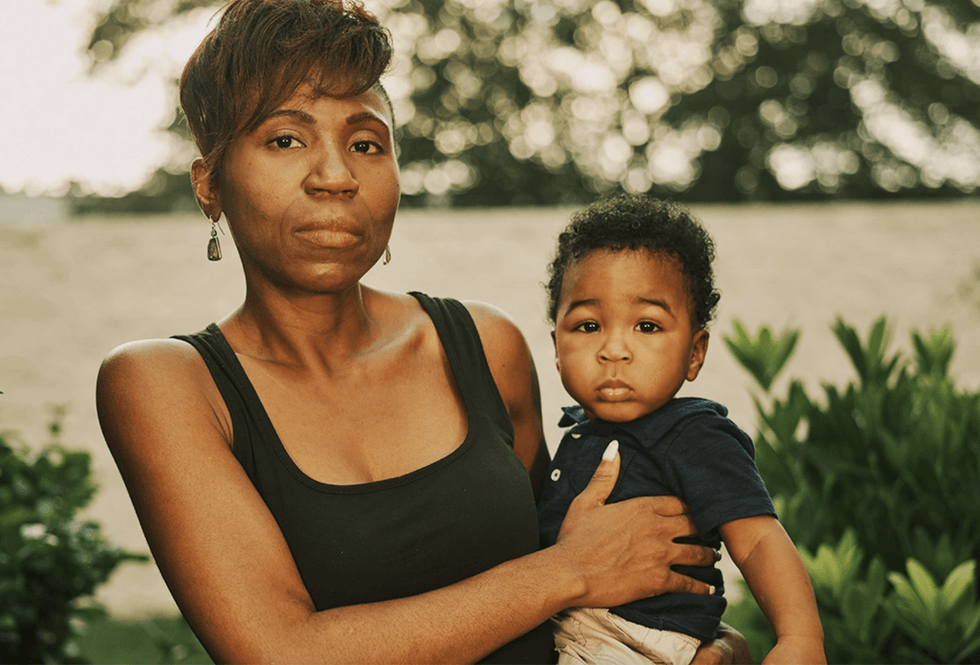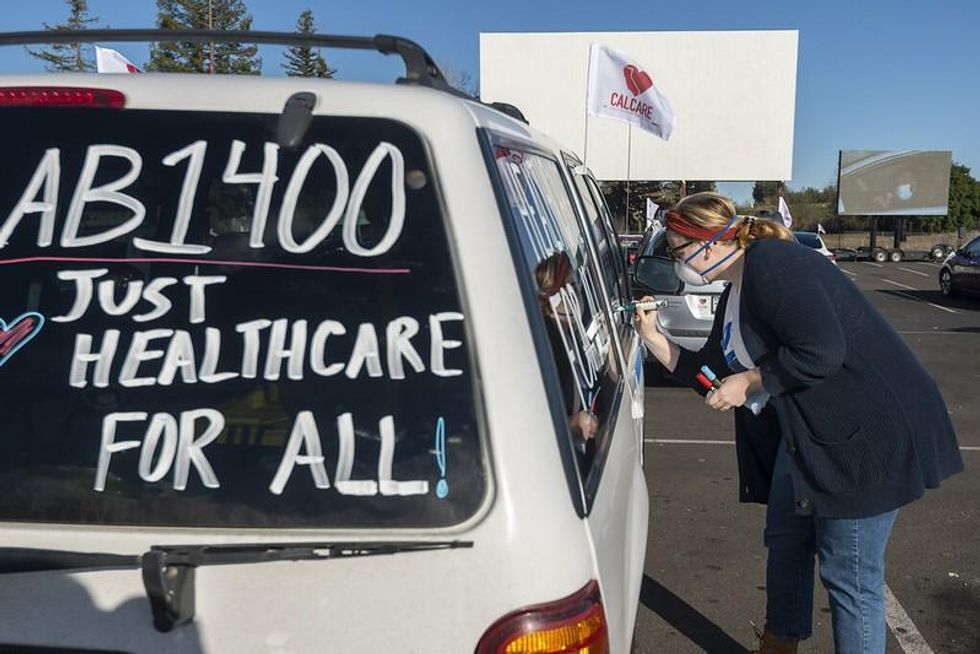"The doctor didn't show up, but the hospital ER still charged $1,012."
"That'll be $45,843 a month for 12 months, please."
"The ER charged him $6,500 for six stitches."
This coming Monday, January 31, the California Assembly is poised to vote on the Guaranteed Health Care for All Act (CalCare), AB 1400, which could bring the state one major step closer to enacting real universal care for all Californians.
"The multi-trillion dollar-healthcare industry is in an all-out panic over the prospect..."
The multi-trillion dollar-healthcare industry is in an all-out panic over the prospect, bombarding legislators and the press with the sky is falling scenarios about the consequences of losing their golden goose.
Most of the opposition, from Republican legislators, industry aligned "experts" and compliant reporters, focuses on perceived cost rather than the devastating medical bills and the mountain of debt and other barriers to care imposed by the industry. But studies show most Californians would pay less under CalCare than they do now for health coverage. And, ultimately, what should our elected leaders' priorities be if not the lives and health security of the people they represent?
Lost in so much of the reporting and "analysis" are the very real people whose lives illustrate why CalCare is needed, people like the family of baby Dorian Bennett, one of those behind the headlines above from the Kaiser Health News (KHH) "Bill of the Month" series.
Dorian Bennett was born two months early in November, 2020, and spent more than 50 days in the neonatal intensive care unit, which resulted in his parents getting a bill in excess of $550,000.
His mom, Bisi Bennett, even works in the insurance industry in Florida, and the hospital where she went was in her insurance's restrictive "network." They were offered an installment payment plan of "just" $45,843 a month. The parents had to fight for a year over the devastating bill while caring for their still ill infant.
"It's indicative of all the ways the system fails the patient. Even the one who does everything right," a law professor who studies health policy succinctly told KHH.
Bisi Bennett pictured with her son, Dorian. (Photo: Kaiser Health News)
It took media pressure for the financial burden to be reduced for the Bennetts. But there are tens of millions like them across the country suffering in silence without the help from reporters, or who don't have the expertise of Bisi Bennett to fight with a cruel and callous health care system which only cares about its bottom line, not protecting patients and their families facing a financial catastrophe while struggling with their most precious commodity--their health.
In 2020, 18 percent of Americans had a staggering $140 billion dollars in unpaid medical bills turned over to collection agencies, the Journal of American Medicine reported last July. Nearly half of U.S. adults listed out-of-pocket costs for medical care as their top economic worry, according to a mid-December survey by the Kaiser Family Foundation.
"We know this is the only way for our patients to get the care they need regardless of their bank account."
So-called "progressive" California was hardly immune from this national crisis. A newly released survey from the California Health Care Foundation (CHCF) found that 49 percent of Californians skipped or postponed needed care because of cost in the last 12 months, and 47 percent of those say their health worsened as a result. A quarter of all Californians reported someone in their family had trouble paying medical bills during the same period.
David Bhatt, whose story was also chronicled by KHH, billed $1,012 for the ER visit for his two-year-old son's burn injury even though the doctor never showed up, lives in Missouri. Jason Dean, charged $6,500 for six stitches due to a job injury, and his wife DeeAnn, who refused because of the cost to go her local ER after serious illness from a dangerous tick-borne infection, live in Tennessee.
You don't have to leave California to hear these stories. Los Angeles Times columnist David Lazarus has written about Californians for years. Among those chronicled: Stephanie Noonan Drachkovitch, billed $800 at a Los Angeles hospital after a horseback riding accident for a plastic walking boot she saw advertised online for $80, a 1,000 percent markup. Christina Gilyutin, billed $336 for a band-aid in a San Francisco hospital for a deep hand cut. And Cathy Birker-Hake, charged $6,223 for two ER visits to a Burbank hospital following a dislocated shoulder including $200 for a cloth sling, a 900 percent markup for the same sling online.
They all had insurance which increasingly is not good enough. Already, 45 percent of Californians with health insurance pay more than a fourth of the premium for single coverage. And the one thing we are surely guaranteed this year is that out-of-pocket costs for Californians are going up--again. Four in ten California firms say they are likely to demand premium increases this year; 28 percent expect to raise deductibles, which you must pay before the insurer begins covering costs, in 2022.
Another 3.2 million Californians still have no health coverage, despite the gains in coverage through the Affordable Care Act; many of them are among the 1.3 million households in California who have medical debt in collections.
CalCare introduced by Assembly member Ash Kalra with 19 co-authors and sponsored by the California Nurses Association/National Nurses United would help end this nightmare. AB 1400 guarantees medical care without premiums, deductibles, or other out-of-pocket costs. It also expands coverage to include dental, vision, hearing, maternity, long-term care, and more.
It terminates the endless cycle of the insurance industry denying claims for diagnostic procedures, referrals, and medications they don't want to pay for even when recommended by a doctor, not to mention the higher charges for going "out of network."
CalCare also provides substantial help in reducing the disgrace of racial disparities. Black Americans, for example, endure nearly double the burden of medical debt as whites. Latinos in California have much higher rates than whites of avoiding needed care due to cost or insurance barriers. CalCare would remove major financial barriers to care and assist rural and medically underserved communities through funding construction, renovation and staffing for healthcare facilities in those areas.
"We have to move this historic legislation forward," California Nurses Association President Cathy Kennedy, RN said in a CalCare zoom rally this week. "We know this is the only way for our patients to get the care they need regardless of their bank account." It will advance, she said, if legislators "have the courage and political will to stand with us."



